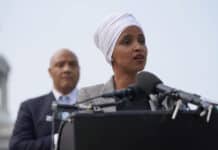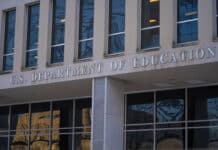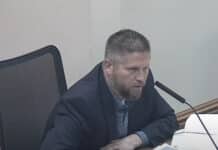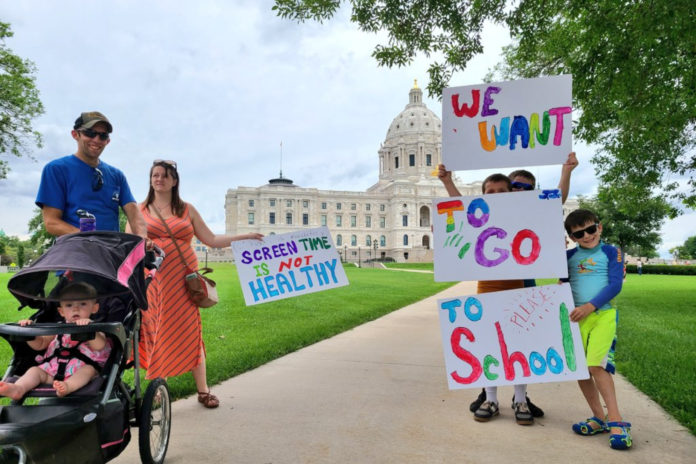
Minneapolis public schools have a graduation rate of about 75%, while private schools in the area graduate over 96% of their students, advocates for school choice said on an Alpha News live panel discussion Wednesday night.
Four educators and mothers gave insight into the public versus private school dilemma and shared the work they have been doing to provide the best education possible for children in Minnesota.
Kofi Montzka, a lawyer and a mother of three boys, said a huge proficiency gap between races in public schools exists in Minnesota. For example, Montzka shared, fourth-graders who are black have a 26% proficiency rate in math, while white kids have a 63% proficiency. For reading, black children have a 34% proficiency rate, while white students are 66% proficient.
Public schools do not set up children for success, said Rebekah Hagstrom, founder and headmaster of Liberty Classical Academy in White Bear Lake. She is advocating for a school choice bill that would give money to parents for private school tuition or private tutors in place of public school education for their children.
SF 960, an education omnibus bill authored by Sen. Roger Chamberlain and passed by the Senate, includes an Education Savings Accounts (ESAs) program. The four women featured on the panel are advocating for ESAs, which allow money to “follow the child,” according to Hagstrom.
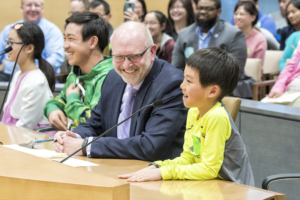
ESAs would give parents money from the state if they decide to pull their children out of public school. That public school district would receive the same amount of federal and local funds as if that child was still attending — but the parents would receive the state-allocated funds for their child, which they would then use for private school tuition, homeschooling, tutors, or any number of education-related assets for their child.
“There’s a lot of people running around today talking about equity and black lives matter … I feel like this is a way to get kids — if parents are unhappy with what their kids are learning — they can move them to a school where their kids can perform better,” Montzka said.
Public school spending
Minneapolis schools receive about $26,000 per student, according to Oredola Taylor, a single mother of three boys and advocate for better education. The tuition at Hope Academy, a private school in Minneapolis, is about $12,000.
“There’s no doubt in anybody’s mind about the outcome, who has the better outcome,” Taylor pointed out.
The Minneapolis Public Schools district has rising graduation rates, but what it doesn’t say, according to Taylor, is that it has lowered its standards, taken away testing, and “basically mask[ed] the data.” She thinks Minneapolis is doing the opposite of creating success for students.
For example, Taylor said, the district will tolerate bad behavior from students in classrooms, and then when violence occurs against teachers, the district says, “‘We need more counselors. We need more therapists’ … and that’s where all the money comes in. [The money is] probably not even touching the kids. It’s touching the administration.”
“Education spending has skyrocketed, and the outcomes are worse,” Taylor said.
School choice: A ‘nonpartisan’ issue?
SF 960 and ESAs “should be a nonpartisan issue,” according to Hagstrom. “If you truly care about racial justice, equity, all of those things that I believe both the left and the right agree upon … the best thing to go forward is to give those parents the opportunity to send their kids to the school of their choice. To force them to stay in public schools that are failing is the greatest injustice you could possibly imagine.”
It is “appalling” that any legislator would oppose this bill, Hagstrom said.
She hopes inner-city failing test scores, COVID-19 shutdowns promoted by teachers unions, and the implementation of critical race theory in virtually all public schools will put enough pressure on citizens to call their legislators and the governor about this bill.
SF 960 is about improving education across all types of schools, Hagstrom argued. She pointed out that if more parents start pulling their kids out of public schools and sending them to private schools, taking the state-allocated money with them, public schools will have to step up their game to compete.
Lawyer Alfrieda Baldwin, who was part of the panel and is an advocate for school choice, said her parents made sacrifices so she could be educated at a private Lutheran school, instead of the public school she attended until fourth grade. She said it changed the trajectory of her life.
“Those of us that are passionate about education and choice — we need to be activists, we need to get out there and make some noise about improving the quality of education for all of our kids,” Baldwin said.
These women and others from the group The Exodus Minnesota are hosting a rally outside the governor’s mansion to support school choice and raise awareness of the bill. The rally is May 8 at 11 a.m.
While it’s important to support SF 960, it’s also important to oppose the Page Amendment, Hagstrom argued. The proposed amendment, named for former Minnesota Supreme Court Justice Alan Page, would change the Minnesota Constitution to guarantee children the right to a quality education. This amendment would give jurisdiction over public schools to the courts, the panelists indicated. The amendment is simply a “virtue signal,” according to Hagstrom, and does not do anything to directly help kids.
On the other hand, SF 960 is a “tangible thing,” Montzka said.
WATCH:





